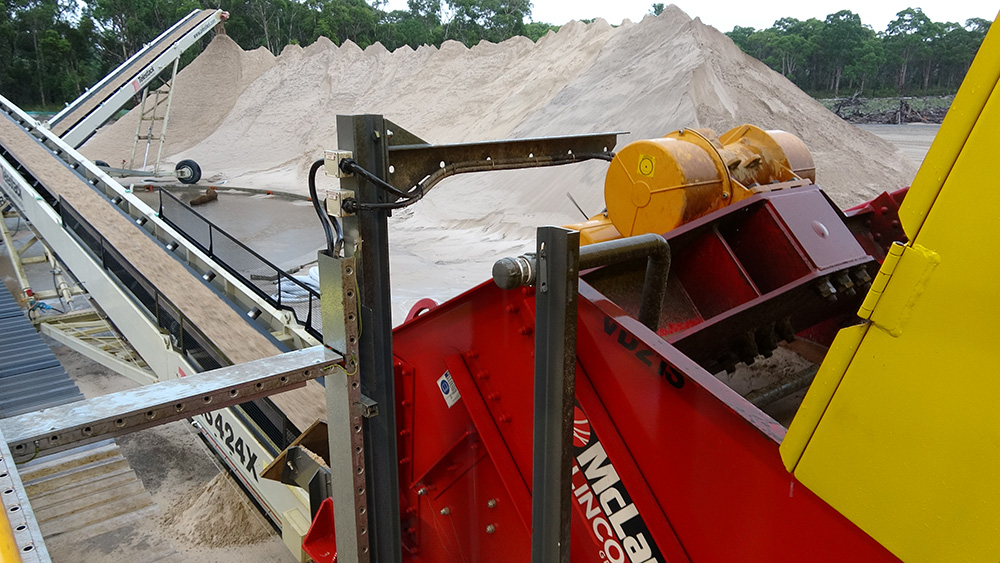
Aggregates-processing solutions company McLanahan has finalised the acquisition of Diefenbach, a leading manufacturer of filter presses and thickeners based in Medolago, Italy, which was first announced in February 2023.
Diefenbach has been designing and manufacturing liquid-solid separation equipment since 1907. With thousands of installations around the globe, the company provides solutions for filtration and dewatering applications in a wide range of industries, including aggregates and mining.
McLanahan and Diefenbach have been working on projects together since 2013. This new partnership will allow McLanahan to serve their customers better worldwide, offering a more comprehensive water-recycling and tailings-management solution and contributing to sustainable materials-processing practices as part of the circular economy.
“As the focus on sustainability and creating a circular economy within the materials-processing industry continues to grow, the need for water-recycling and tailings-management is more important than ever,” said Cory Jenson, executive vice president of sales and business development at McLanahan.
“This acquisition complements McLanahan’s existing line of tailings- and water-management solutions and will allow us to offer more competitive solutions to our customers around the globe.”
Diefenbach will continue to operate as an independent brand in the marketplace and support its customers globally. For the aggregates industry, Diefenbach is partnering with Eagle Iron Works (EIW), another brand in the McLanahan family of companies, to provide a proven line of filter presses and thickeners to EIW customers who are looking to purchase a complete tailings-management and water-recycling solution from a single vendor.
McLanahan is helping Newcastle Sand - a mining operation located in Williamtown, New South Wales, Australia – increase production with a sand-washing plant featuring a highly efficient dewatering screen.
When Newcastle Sand commenced operations in 2019, the company opted to dry wash its sand products with an air separator. However, rainy days would put a damper on the dry process, so Newcastle Sand purchased a small-scale wash plant consisting of a small screw washer.
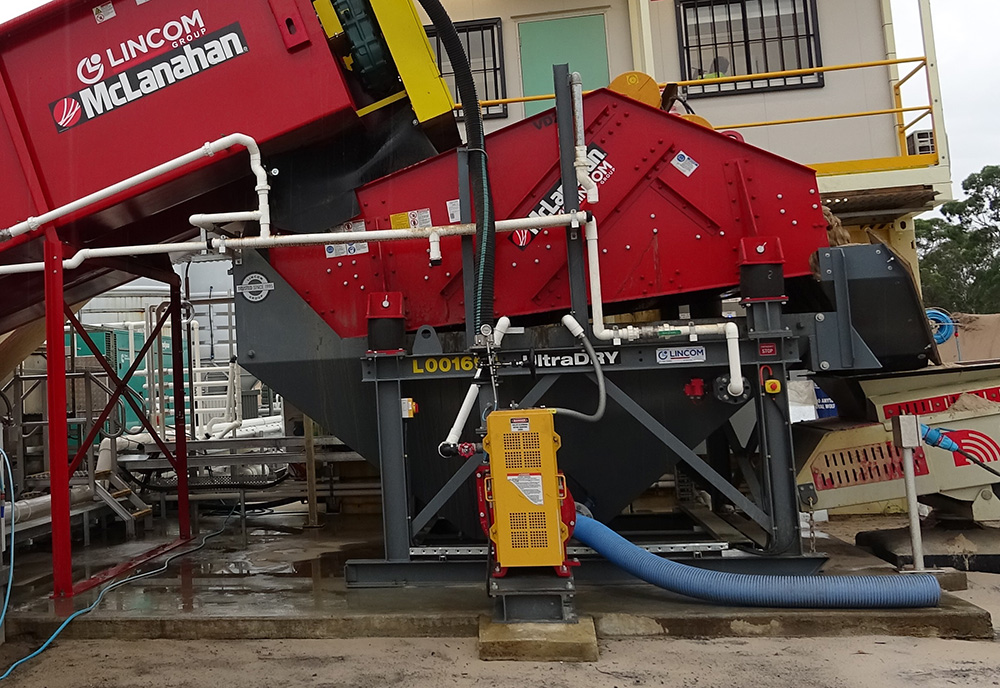
In 2020, Newcastle Sand experienced an increase in demand for washed sand. The company supplemented its small screw washer by adding a higher-volume wash plant to increase production.
But even with the two wash plants, the smaller one and the higher-volume plant, Newcastle Sand was still struggling to meet the demand for washed sand.
“We sought to find a screw washer that could increase our production to keep up with the current market demand,” said quarry manager Eliott Laver.
Laver had a previous relationship with Lincom, McLanahan’s dealer for aggregates wet-processing equipment in Australia, prior to joining the Newcastle Sand team. Working with Lincom and McLanahan, Newcastle Sand installed a McLanahan Fine Material Double Screw Washer and UltraDRY Modular Dewatering Screen.
The McLanahan Fine Material Screw Washer washes, classifies and dewaters Newcastle Sand’s washed sand product, while the UltraDRY Dewatering Screen removes excess moisture from the final product. An integrated sump underneath the UltraDRY Dewatering Screen captures the water that is removed from the sand product and recirculates it back to the screw washer via a pump to aid in the washing process.
Since installing the McLanahan wash plant, Newcastle Sand has more than doubled its production. “That allows us to produce more quality washed sand product,” Laver said. With the UltraDRY Dewatering Screen reducing the moisture content of the final product, Laver said Newcastle Sand is able to sell the product straight from the belt, minimising stockpile requirements.
“Being able to sell our material straight off the belt rather than stockpiling and letting our material dry allows us to reduce the amount of haul times, reduce our product movement or handling,” explained Laver.
In addition to being able to sell the product more quickly, Newcastle Sand has experienced additional benefits from the UltraDry Dewatering Screen, such as improved site housekeeping and recirculation of water back to the wash plant.
“The McLanahan UltraDRY Dewatering Screen allows us to keep our stockpiles clean and tidy,” Laver said. “We have less water runoff, and we’re able to harvest that water and reuse it in the wash plant.”
He added, “We’re able to recover up to 90% of the water from our washing process. In turn, we recycle that water, reducing our environmental footprint in the location.”
Water technology and dewatering-solutions company Xylem has completed its acquisition of Evoqua Water Technologies, a provider of water-treatment solutions and services.
Xylem says the US$7.5bn all-stock transaction creates the world’s most advanced platform of capabilities to address customers’ and communities’ critical water challenges. Xylem provides water and pump technology for global industries including quarrying.
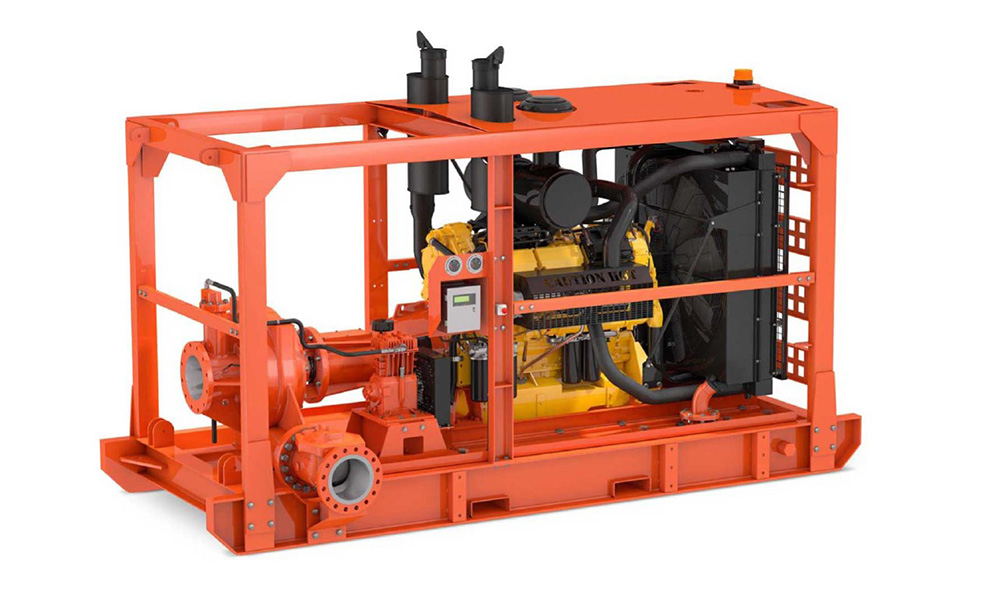
Patrick Decker, president and CEO of Xylem, says that the combination with Evoqua creates a global platform to solve critical water challenges at an even greater scale.
He adds: “Global awareness of water as a systemic risk to society has never been greater. Investment in water solutions continues to accelerate as communities and businesses around the world address intensifying challenges like water scarcity, quality and resilience to climate change – and how to address these issues in an affordable way."
Washington, D.C.-based Xylem says the combined company becomes the world’s largest pure-play water technology company, with US$7.3bn in pro forma revenue and more than 22,000 employees globally. Xylem adds that its portfolio of solutions across the water cycle, including advanced technologies, integrated services, and deep application expertise, will help customers in utilities, industrial and commercial end markets address their most pressing water needs.
The combined company's executive leadership team will be led by Patrick Decker and include senior leaders from both Xylem and Evoqua. Xylem has also appointed Lisa Glatch and Lynn Swann, former Evoqua directors, to serve as members of its board of directors.
Xylem announced in August that it made total revenue of US$1.7bn in the second quarter of 2023, with reported growth of 26% and organic growth of 15%, surpassing prior guidance. The Q2 results include the acquisition of Evoqua Water Technologies.
Xylem says that orders were up 10% on a reported basis and down 2% organically, while backlog grew to US$5.3bn, up 7% organically and including US$1.3bn from Evoqua, with resilient underlying demand.
Second-quarter earnings, excluding the acquisition, exceeded Xylem’s previous standalone guidance.
Xylem has released a new dewatering pump which it says has been developed to significantly increase efficiency, cut costs, and minimise downtime for construction and mining customers.
It adds that the Godwin HL270M Dri-Prime Pump is designed to meet the unique demands of deep-mine and high-pressure water transfers and can deliver cost savings of up to 10% compared to competing solutions.
With greater hydraulic efficiency and optimised head and flow, it reduces the need for multiple pumps in series, lowers energy consumption, simplifies operations and maintenance, and minimises premature wear. Field-test participants have already used the pump to meet project goals with fewer assets, simpler operations, and reduced maintenance costs.
The solution, part of the Godwin Ultrahigh-head range, also enables operators to lower carbon emissions.
“Meeting the evolving needs of our customers is paramount,” said Mike Ramos, global product manager at Xylem. “The Godwin HL270M meets the unique demands of deep-mine and high-pressure water transfers. It allows our customers to go deeper and further, making operations more efficient, sustainable, and safe.
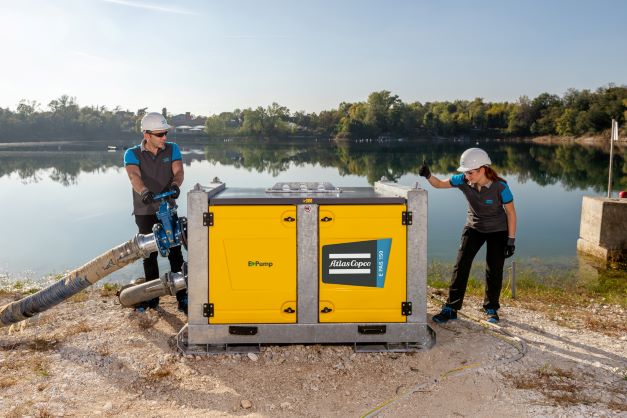
“This product is also a great example of a sustainable and smart business. The pump uses less power, reduces the need for multiple pumps, minimises premature wear, and offers longer life between repairs.
Thompson Pump has announced that its distributor Florida Pumping Solutions (FPS) is expanding its services with the acquisition of Northern Florida-based socking company American Sock & Dewatering.
FPS says the addition of American Sock means it can now provide a full range of dewatering services.
FPS is a distributor for Thompson Pump and Manufacturing Company, a manufacturer of heavy-duty, diesel-powered bypass and dewatering pumps.
With the addition of American Sock, FPS says it is able to improve the customer experience by now providing the full range of construction dewatering services, from start to finish, including socking – a technique used to prevent water intrusion during excavation and construction, slurry pumping, bypass pumping, emergency response and more. This allows FPS to meet the unique North Florida challenges such as low-lying terrain, coastal areas and heavy rain and flooding which require effective dewatering and flood-control solutions for construction, agriculture and other industries. FPS says it is excited to be at the forefront of delivering cutting-edge pumping services to clients, especially with the help of Thompson Pump.
“This move not only cements us as a leader in the pumping industry, but it ensures we are supplying even greater value to our customers – with more efficiency and faster project completion times, helping to cut down on costs,” said Jay Friemark, general manager at FPS.
Thompson Pump provides multiple models of dewatering pumps with a focus on rotary and piston pumps, as well as vacuum-assisted models, for wellpoint and sock underdrain.
FPS is headquartered in St. Augustine, Florida, and offers a range of services including sales, rental and service of Thompson Pumps.
Atlas Copco has developed a new range of electric surface self-priming dewatering pumps for various applications.
The E-Pump range comprises the E PAS and PAC electric models, which feature a canopy and open set configuration. Atlas Copco says this flexible solution is ideally suited for many applications like sewage bypass in the municipality sector and construction projects with access to a power source. It adds that E-Pumps can successfully manage demanding flows and large solids with a lower total cost of ownership (TCO) and no CO2 footprint during pumping operations with digital connectivity solutions.
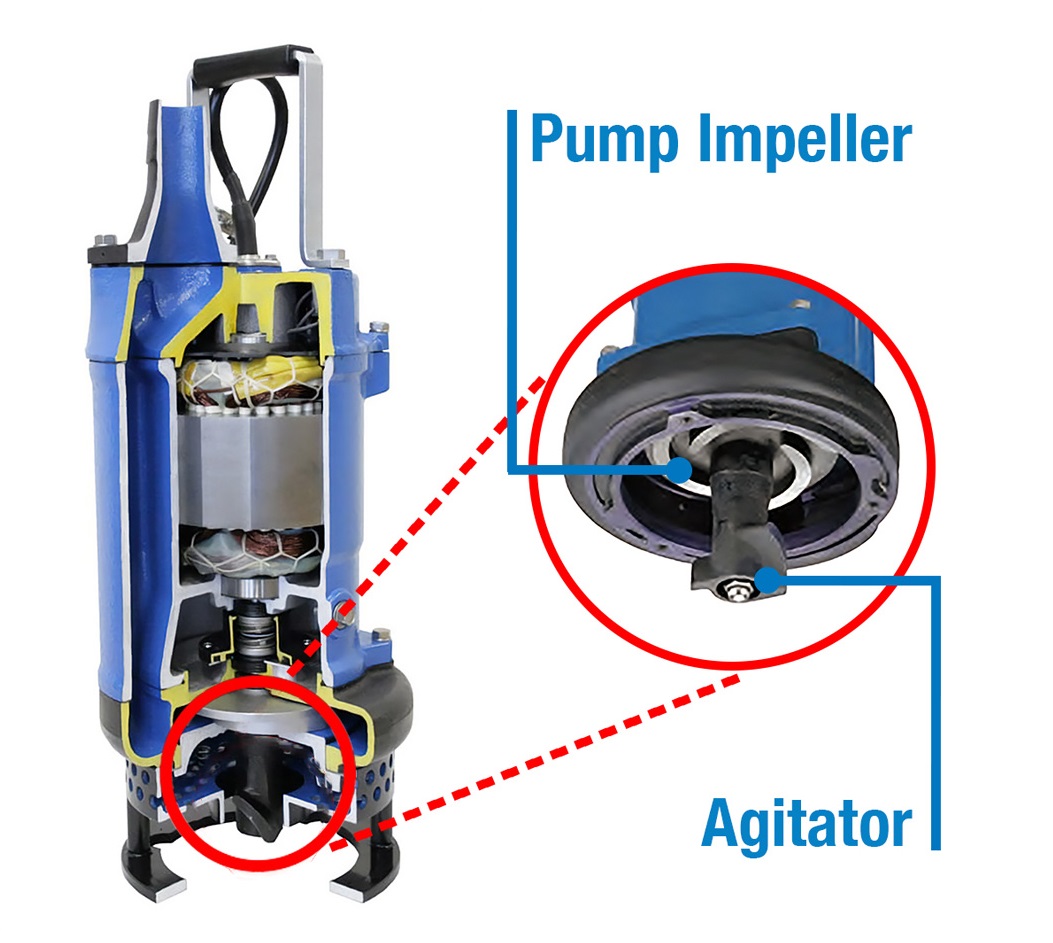
The manufacturer says the new range offers an electric, no-CO2-emission alternative to diesel-powered surface dewatering pumps during pumping operations. This allows customers to reduce their emission footprint and operate in emission-restrictive areas with no fuel consumption. While the PAC electric pumps, an open configuration range with a galvanised frame, will mostly address the North American market, the E PAS is designed with a canopy to meet European customer needs.
The E PAS features an intelligent priming solution to ensure that the pump’s priming system only runs when necessary, reducing energy consumption and noise generation under normal operating conditions. Atlas Copco says the E PAS model emits reduced noise levels, making it ideal for noise-sensitive environments. The priming system ensures no carryover contamination, and the canopy set units are up to 120% spillage-free, keeping the workplace and environment clean. E PAS dewatering solutions can intelligently start and stop based on float signals.
The operating expense of the E PAS is up to 40% lower, depending on the difference between local diesel and electricity costs. Also, electric motors' maintenance and servicing costs are substantially lower than diesel engines. Time to service is less with patented hinge doors for easy access to serviceable parts.
The E PAS model features Atlas Copco’s variable speed drive (VSD) solution, increasing the efficiency of the pump and offering energy savings of up to 40% with an extended pump life.
“The E PAS and PAC electric lines of surface dewatering pumps are an exciting addition to the electric-powered range of products from Atlas Copco,” says Saksham Dube, global marketing manager at Atlas Copco Power & Flow. “They offer excellent performance, low cost of ownership, reduced footprint and unique digital connectivity, contributing towards Atlas Copco’s efforts to create a more sustainable future.”
Tsurumi Pump has partnered with Briggs and Stratton to offer North American users its engine-driven trash and dewatering pumps another choice and continuously high after-sales support. This enables popular models in Tsurumi’s EPT and TE series to achieve compliance with the latest regulations of California’s Air Resources Board (CARB) and allow them to be sold in the state.
The Vanguard Series engines will offer the same horsepower and RPM figures and be an option on 2” and 3” centrifugal dewatering pumps and 2” and 4” trash pumps under the TE3-50V and TE3-80V, and EPT3-50V and EPT3-100V model designations, respectively.
Standard features on Vanguard single-cylinder engines include an integrated cyclonic air cleaner that doubles air-filter replacement intervals to 600 hours, an acoustically designed fuel tank and muffler optimised to reduce noise, and easy, one-pull starting in cold temperatures as low as -20° F.
Japan-headquartered manufacturer Tsurumi says that its agitator pumps deliver dependability in slurry applications
The company adds that its agitator pumps are made with wear-resistant components like high-chrome impellers and hard cast-iron volutes that demonstrate outstanding performance and durability when handling abrasive materials.
One of the largest challenges that contractors face when pumping slurry water is finding the right equipment to efficiently and seamlessly complete the job. Pumping from pits that contain sand, grits or debris requires heavy-duty equipment, specifically designed to handle abrasive materials to work continuously without failure. Tsurumi states that agitator pumps are the answer.
Agitator pumps utilise an agitator propeller that shares the same shaft as the pump's impeller. While the two spin in the same direction, the agitator blades are in the opposing orientation to those of the impeller. The agitator provides a propelling force to stir up solids near the floor while the impeller pumps the now suspended solids along with the fluid. They keep the mud circulating to avoid solids from settling while allowing pumping to continue without obstructions.
“The use of agitators in coal mines and quarries is well known, but not everyone is aware that they can be used for any liquid containing solids that needs to be pumped,” explains Kevin Boicken, Southeast regional sales manager at Tsurumi Pump. “We recently installed an agitator at a construction site that had solids suspended in the water being pumped. A standard dewatering pump could become suffocated by sucking the solids to the small hole screen, preventing the liquid to be pumped.”








